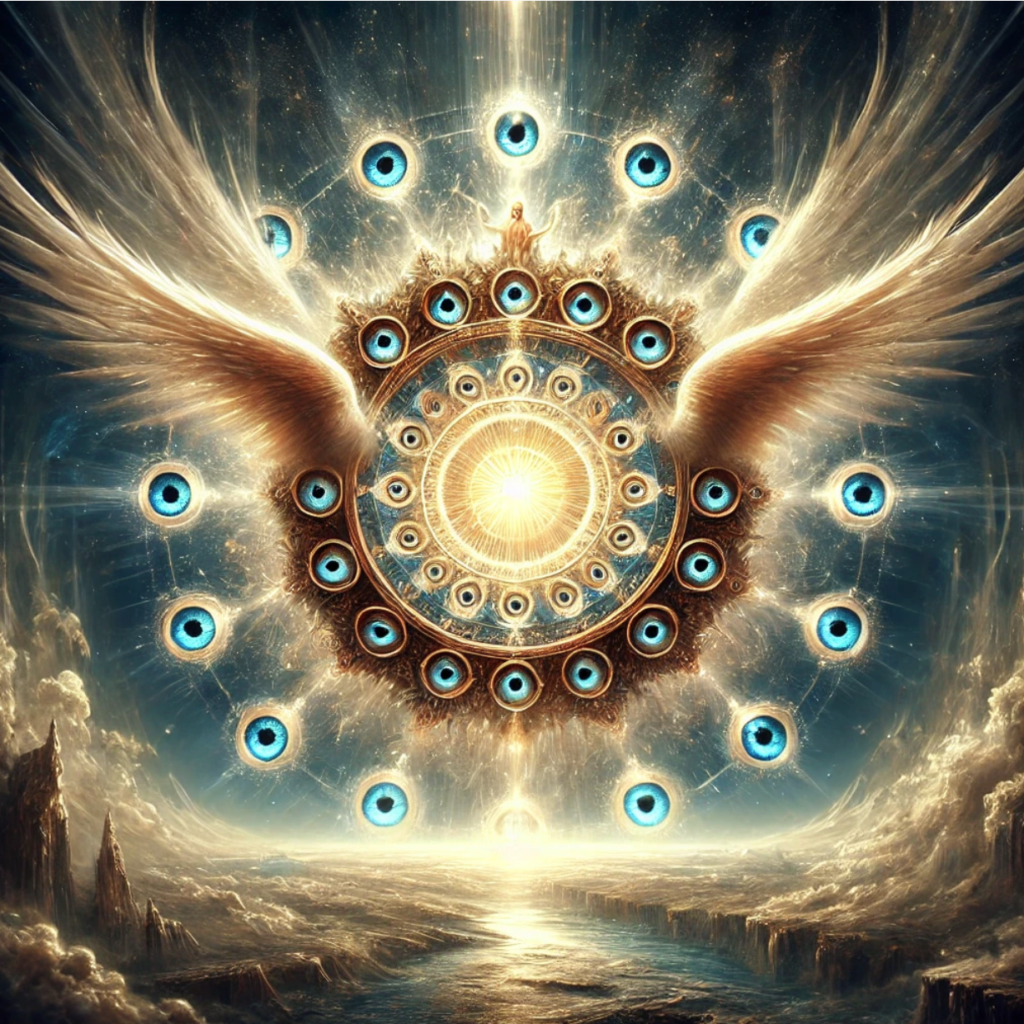The Thrones are a class of angelic beings found within Christian angelology, particularly in medieval and early Christian mystical traditions. Thrones are part of the angelic hierarchy, which is based on biblical references and further developed by theologians such as Pseudo-Dionysius the Areopagite in the 6th century. They are considered one of the nine orders or choirs of angels, often depicted as mysterious and powerful beings that serve a unique function within the celestial realm.


Thrones in the Angelic Hierarchy
In Christian angelology, the angels are grouped into three “spheres” or “triads,” with each triad containing three choirs of angels. The Thrones belong to the first sphere, the highest and most exalted group, which includes:
- Seraphim: The highest order of angels, known for their closeness to God and their constant praise of His holiness.
- Cherubim: Guardians of God’s glory and keepers of divine wisdom, often depicted as beings of immense knowledge.
- Thrones: Positioned below the Seraphim and Cherubim, Thrones are often considered the embodiment of God’s divine justice and authority.
Role and Function of Thrones
- Embodiments of Divine Justice: Thrones are said to represent the perfect and impartial judgment of God. They serve as instruments of divine justice, ensuring that all things in the universe are aligned with God’s will. Their name reflects the idea that they are the “thrones” or seats of God’s authority, where divine law and order are administered.
- Contemplation and Divine Will: Thrones are also described as angels of deep contemplation. They do not merely execute God’s will but are deeply connected to understanding and meditating on it. As intermediaries between the higher celestial beings (like the Seraphim) and the lower orders of angels, Thrones help transmit God’s decisions and judgments to the other angels and ultimately to creation.
- Carriers of God’s Chariot: In some mystical traditions, the Thrones are described as supporting the throne or chariot of God. This imagery draws on the vision of the prophet Ezekiel (Ezekiel 1:15-21), where he describes the divine chariot, carried by celestial beings with wheels full of eyes, symbolizing divine knowledge and awareness. The Thrones are often connected to this vision, serving as the living wheels or the foundation upon which God’s presence moves.
Biblical and Apocryphal References
Although the Bible does not elaborate much on Thrones, they are mentioned in a few key places:
- Colossians 1:16: In this New Testament verse, Paul describes the various levels of creation that include Thrones, suggesting their place in the celestial hierarchy:”For in Him all things were created: things in heaven and on earth, visible and invisible, whether thrones or powers or rulers or authorities; all things have been created through Him and for Him.”Here, Thrones are grouped alongside other divine entities, reinforcing the idea that they are significant cosmic forces, part of God’s celestial order.
- Ezekiel’s Vision: Although Ezekiel’s vision of the divine chariot does not explicitly mention Thrones, many theologians and mystics have interpreted the “living wheels” with eyes as being connected to the Thrones. The vision describes beings that move in perfect harmony with God’s will, a trait associated with the Thrones’ role in executing divine judgment and justice.
Depictions in Art and Mysticism
Thrones are less commonly depicted in Christian art compared to other angelic orders like Seraphim or Cherubim, likely because of their abstract and mysterious nature. When they are portrayed, they are often shown as:
- Wheels within Wheels: Drawing on Ezekiel’s vision, Thrones are sometimes depicted as celestial wheels or spheres, covered with many eyes to symbolize their ability to see everything and to understand God’s justice perfectly.
- Majestic Thrones: In other representations, Thrones are depicted as majestic seats or platforms made of heavenly material, symbolizing their role as divine carriers of God’s authority. They may be shown as glowing, radiant figures, often with wings and surrounded by light.
Symbolism of Thrones
- Divine Order and Authority: Thrones symbolize the highest forms of divine authority and governance. Their connection to God’s justice and law emphasizes the idea that all creation is under the governance of divine will.
- Contemplation and Knowledge: As beings dedicated to deep contemplation and understanding, the Thrones reflect the importance of wisdom, understanding, and the proper application of justice. They are often seen as intermediaries of God’s wisdom, carrying out His will with precision and fairness.
- Impartial Judgment: The Thrones embody impartiality, judging all things according to divine wisdom. Their role as judges makes them central figures in the administration of cosmic justice.
Influence in Medieval and Christian Mysticism
Thrones have played an influential role in Christian mysticism and theology, especially through the writings of Pseudo-Dionysius the Areopagite. In his work “The Celestial Hierarchy”, Pseudo-Dionysius outlines a detailed angelology that greatly influenced medieval Christian thought. He emphasizes that the Thrones are beyond human comprehension, existing at a level of divine contemplation that is difficult for mortals to grasp.
In mystical writings, Thrones are often invoked as beings of divine wisdom, who not only execute God’s law but also reveal hidden aspects of His nature to those who seek spiritual enlightenment.
Modern Interpretations
In modern Christian thought, the Thrones, like many other angelic orders, are often seen more symbolically than literally. They represent the principles of divine justice, order, and wisdom rather than being seen as concrete entities. However, in certain theological circles and mystical traditions, the Thrones are still considered important figures within the celestial hierarchy, serving as reminders of the vastness of the divine order and the mysteries of God’s justice.
Conclusion
The Thrones occupy a unique position in the angelic hierarchy, embodying divine justice, wisdom, and authority. Their role as both contemplative beings and executors of God’s law makes them essential figures in Christian theology, even though they are not as prominently featured as other angels like the Seraphim or Cherubim. With their connection to the mystical vision of Ezekiel and their symbolic function as carriers of God’s chariot, the Thrones represent the order and fairness of divine governance, ensuring that God’s will is carried out in the cosmos.

Author

Josh Morley holds a Bachelor’s degree in Theology from the Trinity School of Theology and a Diploma in Theology from the Bible College of Wales. His academic journey involved interfaith community projects and supporting international students, experiences that shaped his leadership and reflective skills. Now based in Liverpool, Josh is also the founder of Marketing the Change, a digital agency specializing in web design and marketing.
View all posts




